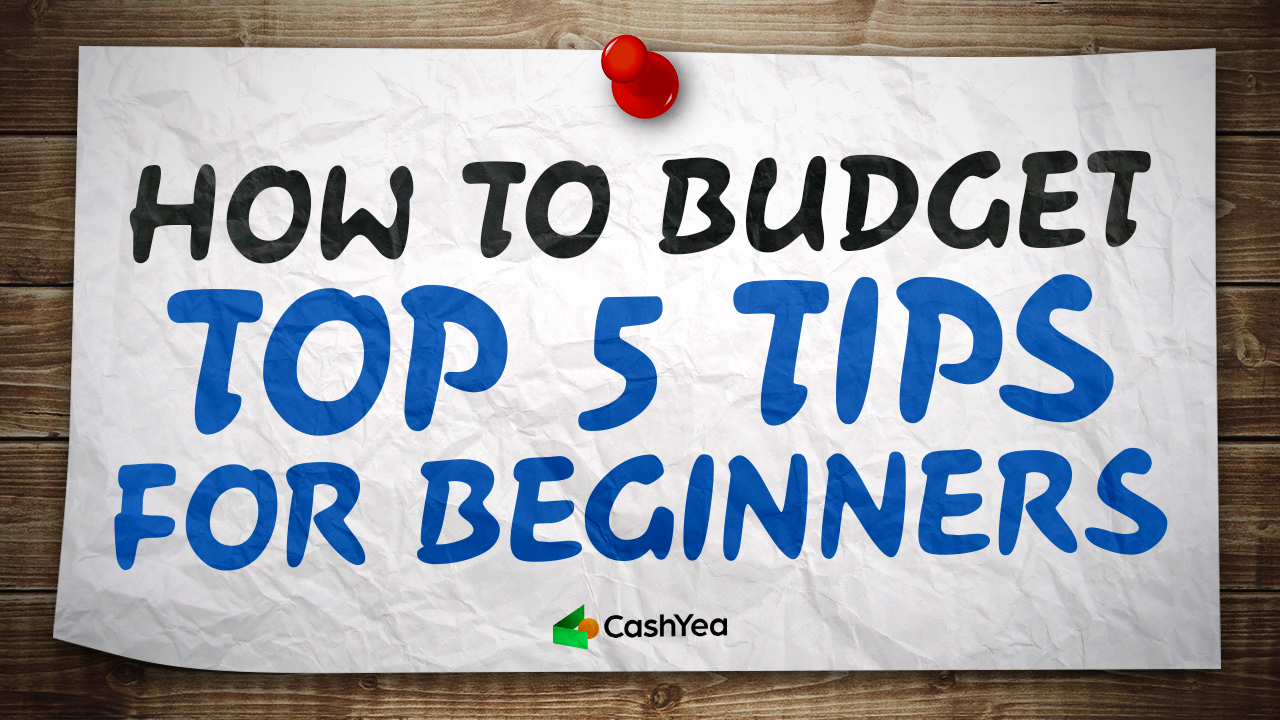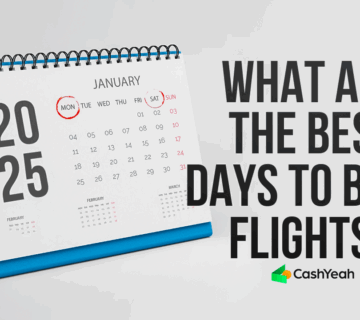Money management is not an easy subject, but it is crucial to leading an enjoyable and happy life. Unfortunately, very few people can afford the luxury of not worrying about their expenses, especially in the early stages of adulthood. That’s why budgeting is crucial. If you control your spending habits and expect the unexpected, then you’re ready for anything. But to achieve this, you need to start somewhere. That’s why today we will present our top 5 budgeting tips for beginners.
Also, if you ever need to further improve your budget, check out CashYeah, where you can earn rewards for tasks!
What Exactly Is a Budget?
First, let’s talk about what exactly a personal budget is.
A budget is basically your personal financial plan. You create it for a certain period of time, e.g. a month, a week or a year (we recommend a month) and, taking into account your net income, plan how much money you plan to spend on what. The way you spread it out for yourself is, of course, completely dependent on what your needs are. Creating a personal budget is one of the best money-saving tips you can get. Most people start by using the 50/30/20 rule, which is that 50% of your income goes to things you need (groceries, health insurance, car payments, etc.), 30% to things you want (going out, clothes, streaming services), and 20% to savings.
In our opinion, it should be broken down more 50/20/20/10.
- 50% of the things you need
- 20% of the things you want
- 20% for savings
- 10% for emergencies.
However, as we say. It all really depends on you.
Why Is Budgeting Important?
Some of you may be asking yourself, Do I even need to budget?
The answer is ALWAYS: Yes
Even if you have confidence in your judgment and have a fixed monthly income that meets most of your needs, budgeting is still the right thing to do. Having control over your personal finances is key to being in control of your own life. Nowadays, the world is changing fast and things happen very quickly. Therefore, you must always know where you stand. If you have a clear picture of how much money you are spending and how much you are saving, you can avoid that tightness in your chest that comes when you see a big 0 in your bank account. Believe us, it’s one of the worst feelings in the world.
In addition, budgeting helps you save so you can go on that dream trip or buy that car you’ve always wanted. In fact, people often can’t believe the things that are possible if you save a small amount each month. Even $100 can get you far if you think about it from the perspective of a few years.
Top 5 Budgeting Tips for Beginners
Budgeting is important, but that doesn’t mean that it’s easy. Especially if you’re just starting out, making it a routine can be quite difficult. Soon you will be asking yourself: but why should I save money when I can just buy the things I want? Why shouldn’t I do it now?
Spending all your money is very tempting, but it is not always a wise move. Sometimes you need to keep the bigger picture in mind. That’s why today we’re going to give you our top 5 tips to help you create a monthly budget. With us, you will be able to meet your financial goals, establish an emergency fund and sleep soundly.
So let’s get started.
-
Analyze Your Spending
Anyone who wants to start working with a monthly budget should first conduct a thorough analysis of their finances. After all, it happens very often that we think we know exactly how much we spend every month, and then it turns out that we don’t really have a clue about anything. We check our bank statement and suddenly there are a million small transactions on it, which in total make up quite a substantial sum that is just slipping away from you over and over again.
This is why you need to objectively review your monthly expenses. The best thing to do is to open Excel or Numbers and arrange everything for yourself. Take stock of how much money you spend on things like bills and house payments, how much you spend on food, and how much you spend on leisure. On top of that, create a special category for unforeseen expenses (of which there are certainly more than you think). This way you’ll have a full picture of what your daily life looks like and identify the areas that can create the biggest costs.
-
Get Your Priorities Straight
Once you’ve created an in-depth analysis of your spending, you’ll have a complete picture in front of you of how much you spend on the various things in your life. You’ll see how much you spend on coffee out on the town, wine with friends, or Uber, and how that compares to the things you really need, such as groceries or a doctor’s appointment. After all, the key when creating a budget is to figure out what is most important to you. Now, we’re not saying that there’s no room for pleasure in life. Each of us needs something to break out of the daily routine and remind us why we do it all. However, going out on the town shouldn’t be the priority, but rather a bonus. It’s best to create your own list of things that are essential to you. Put the things you need to survive first, and the further you go, then put the items you can do without. Next, set spending limits for each of them that fall within the amount you can devote to day-to-day expenses. The lower the priority of an item, the less money should be allocated to it.
-
Download a Budgeting App
If you’re a millennial or a Gen-Z struggling to make the leap from teenage years into adulthood, probably the best way to start budgeting is to download a good app. After all, technology’s job is to make our lives easier, and money management is a huge part of that. That’s why there are many high-quality programs available online designed to streamline the home budgeting process. The best budgeting apps can make it much easier to control your finances. Some of them can even be connected directly to your account so that they can analyze your expenses and make personalized recommendations to make your life easier. Plus, they’ll let you know if you go over a set limit in a given month. This is a really great solution for people who find it difficult to plan their spending or simply don’t want to agonize over the lengthy process.
On our blog, we have an overview of the best budgeting apps for creating a monthly plan for all your expenses. A budgeting app can even help you save money traveling. Be sure to browse through them and see which of the presented solutions best fits your needs.
-
Set Goals for Yourself
We know that sticking to a monthly plan may seem pointless at first. After all, why would you want to save money when you could just spend it on all your smallest whims? Well, the key to avoiding such thinking is to create specific savings goals for yourself. Think about what you’ve always dreamed of and what your long-term financial plans are. How about a new car? Or a downtown apartment? If you strive for something it will be easier for you to grit your teeth and give up going out on the town or taking a short trip. What’s more, once you’ve managed to raise the right amount of money and can make your dream come true, you’ll be doubly happy about it, because you’ll have achieved it thanks to your persistence and dedication.
When it comes to the best way to pursue your financial goals, in our opinion, making a thorough plan is key. Set yourself a specific time frame, and calculate how much you need to put aside each month in order to accumulate the needed amount within it. In addition, set up a special savings account named after your dream purchase. Then you will always remember what you are aiming for when you transfer money to it.
-
Expect the Unexpected
At the end of our list we left a piece of advice that is not at all obvious. Well, the truth is that we can plan our lives every hour, and still moments will occur in our lives that we would never expect. It could be anything from winning the lottery to a fatal illness in the family or having to move unexpectedly. You never quite know what tomorrow will bring, and it’s important to keep that in mind when creating your monthly budget. The best thing to do is to establish a separate account for unforeseen expenses, to which you will send a certain amount of money each month. But note, we are not talking about a savings account here. We’re talking about something completely different.
What we mean is a special pile of money that will allow you to stay calm even in the most difficult situations. With it, you’ll know that even if something completely unexpected happens tomorrow, you’ll still be able to handle it without straining your current account or draining your savings. This will spare you a lot of stress.
Conclusions
To make a budget requires really careful planning and is not at all that easy. In doing so, you need to take into account both fixed expenses and variable expenses, plus make room for savings and unexpected situations. If you’re having trouble with this, try applying the tips we presented in the article. Remember, too, that you can use CashYeah to increase your month-to-month income and allow yourself to spend more money on pleasures. It’s all up to you, but controlling your finances is the key to a comfortable life.
Still not convinced why saving money is important? Check out the rest of our blog to learn more!




